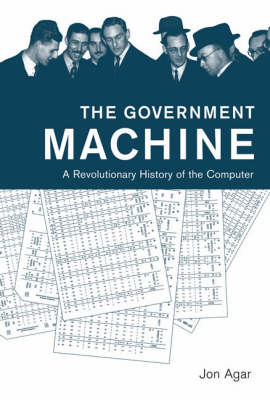
The Government Machine
A Revolutionary History of the Computer
Seiten
2003
MIT Press (Verlag)
978-0-262-01202-7 (ISBN)
MIT Press (Verlag)
978-0-262-01202-7 (ISBN)
- Titel ist leider vergriffen;
keine Neuauflage - Artikel merken
An examination of technology and politics in the evolution of the British "government machine."
In The Government Machine, Jon Agar traces the mechanization of government work in the United Kingdom from the nineteenth to the early twenty-first century. He argues that this transformation has been tied to the rise of "expert movements," groups whose authority has rested on their expertise. The deployment of machines was an attempt to gain control over state action -- a revolutionary move. Agar shows how mechanization followed the popular depiction of government as machine-like, with British civil servants cast as components of a general purpose "government machine"; indeed, he argues that today's general purpose computer is the apotheosis of the civil servant. Over the course of two centuries, government has become the major repository and user of information; the Civil Service itself can be seen as an information-processing entity. Agar argues that the changing capacities of government have depended on the implementation of new technologies, and that the adoption of new technologies has depended on a vision of government and a fundamental model of organization. Thus, to study the history of technology is to study the state, and vice versa.
In The Government Machine, Jon Agar traces the mechanization of government work in the United Kingdom from the nineteenth to the early twenty-first century. He argues that this transformation has been tied to the rise of "expert movements," groups whose authority has rested on their expertise. The deployment of machines was an attempt to gain control over state action -- a revolutionary move. Agar shows how mechanization followed the popular depiction of government as machine-like, with British civil servants cast as components of a general purpose "government machine"; indeed, he argues that today's general purpose computer is the apotheosis of the civil servant. Over the course of two centuries, government has become the major repository and user of information; the Civil Service itself can be seen as an information-processing entity. Agar argues that the changing capacities of government have depended on the implementation of new technologies, and that the adoption of new technologies has depended on a vision of government and a fundamental model of organization. Thus, to study the history of technology is to study the state, and vice versa.
Jon Agar directed the UK National Archive for the History of Computing from 1994 to 2001. He is the author of Science and Spectacle: The Work of Jodrell Bank in Postwar British Culture, Turing and the Universal Machine: The Making of the Modern Computer, and Constant Touch: A Global History of the Mobile Phone.
| Erscheint lt. Verlag | 4.11.2003 |
|---|---|
| Reihe/Serie | History of Computing |
| Zusatzinfo | 52 illus. |
| Verlagsort | Cambridge, Mass. |
| Sprache | englisch |
| Maße | 152 x 229 mm |
| Gewicht | 903 g |
| Themenwelt | Geisteswissenschaften ► Geschichte |
| Mathematik / Informatik ► Informatik | |
| Sozialwissenschaften ► Politik / Verwaltung | |
| ISBN-10 | 0-262-01202-2 / 0262012022 |
| ISBN-13 | 978-0-262-01202-7 / 9780262012027 |
| Zustand | Neuware |
| Haben Sie eine Frage zum Produkt? |
Mehr entdecken
aus dem Bereich
aus dem Bereich
Buch | Hardcover (2012)
Westermann Schulbuchverlag
CHF 44,90
Schulbuch Klassen 7/8 (G9)
Buch | Hardcover (2015)
Klett (Verlag)
CHF 29,90
Buch | Softcover (2004)
Cornelsen Verlag
CHF 23,90


